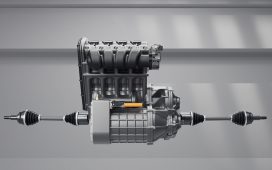
Shannon Newton is the CEO of the Arkansas Tucking Association. (Karen E. Segrave)
Editor’s note: This article is part of a special magazine celebrating 40 years of Arkansas Business. The full magazine is available here.
Life in the transportation industry isn’t for those who desire tranquility and stability in the workplace.
Fueling the supply chain needs of producers, manufacturers and consumers can cause headaches and sleepless nights for even the most experienced, financially stable companies. The current freight recession has driven down prices while inflation and other factors have driven up the costs of transportation staples such as equipment, driver pay, fuel and insurance.

In such trying times, transportation companies adjust to the short-term dynamics while trying to maintain a long-term outlook. For smaller companies, the juggling act is more difficult because one bad year can end a company living on a razor-thin margin.
“I’ve been in it going on 40 years now, and trucking is a roller-coaster ride,” said Jeff Loggins, owner of Loggins Logistics in Jonesboro. “You just hope the valleys aren’t too low.”
Loggins, chairman of the Arkansas Trucking Association’s board of directors, said his short-term goal is survival — he has lost money the past two years, he said — until the national economy turns around.
“If you go and gripe about the price of groceries or the price of anything, it’s not the stores or the manufacturers; it’s the cost of transportation,” Loggins said. “We are having to jack prices as much as we can, which right now we can’t. It’s a bad storm right now.”
The good news is that trucking executives are well-versed in the chaos of the industry. Judy McReynolds, the CEO of ArcBest Corp. in Fort Smith, said the current flux that started with a pandemic is really nothing that unheard of.

“We focus on being a resilient, stable company with a growth strategy that is responsive,” she said. “When you look across the industry, you continue to see supply chain disruptions for the customers we all have. It is almost like they have become the norm.”
ArcBest set company records in 2022 with more than $5 billion in revenue and nearly $300 million in income. The company reported 2023 fiscal revenue of $4.4 billion and income of $195.4 million in early February.
“Rather than sit around and worry about the challenges, we like to turn those challenges into opportunities,” McReynolds said. “Whether it is in the short term and long term, we are doing that.
“We have to make good decisions in the short term, but we are a long-term thinker in the way we approach our business. That’s why we are still here today, because we have that mindset.”
Shannon Newton, the president of the ATA, said conditions will improve for truckers of all size when the freight economy improves.
“People are going to continue to buy things, and truck transportation is going to continue to be the predominant mode of [moving goods],” Newton said. “We are going to continue to move goods from where they are made to where they need to be consumed. People are not going to change their habit and start going down to the port to pick up their groceries. Truck transportation is in it for the long haul.”

Those long hauls, and short hauls as well, may increasingly be delivered by electric or autonomous vehicles. The emerging technologies have a ways to go, industry officials believe, before they are financially doable for widespread use.
J.B. Hunt Transport Services Inc. of Lowell, an ardent believer in such technology, has experimented with EVs and autonomous trucks.
“The future of our industry will be driven by innovation — generating disruption, adapting to changing environments and accelerating how we can apply that to better serve our customers,” J.B. Hunt CEO Shelley Simpson said. “Emerging technology will continue creating opportunities that make the industry safer, better informed and more efficient. And as infrastructure and support for zero-emission vehicles become more commercially available, the industry will operate more cleanly, reducing our overall carbon footprint.”









